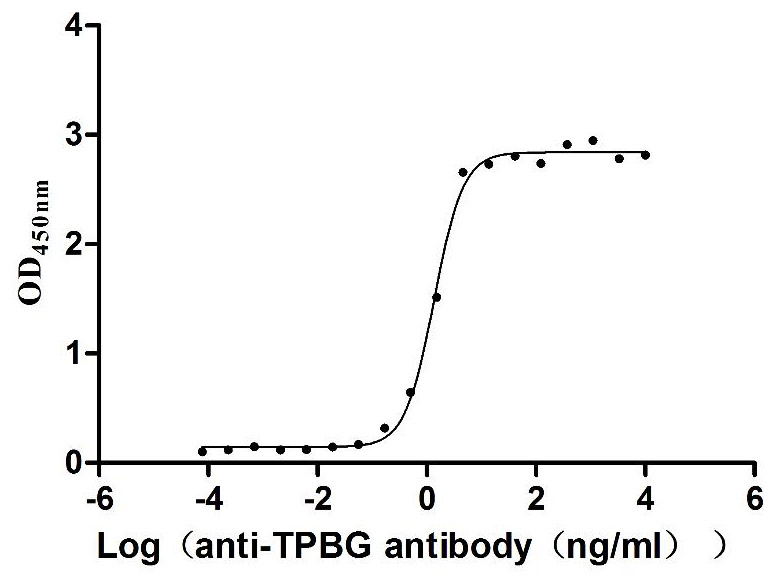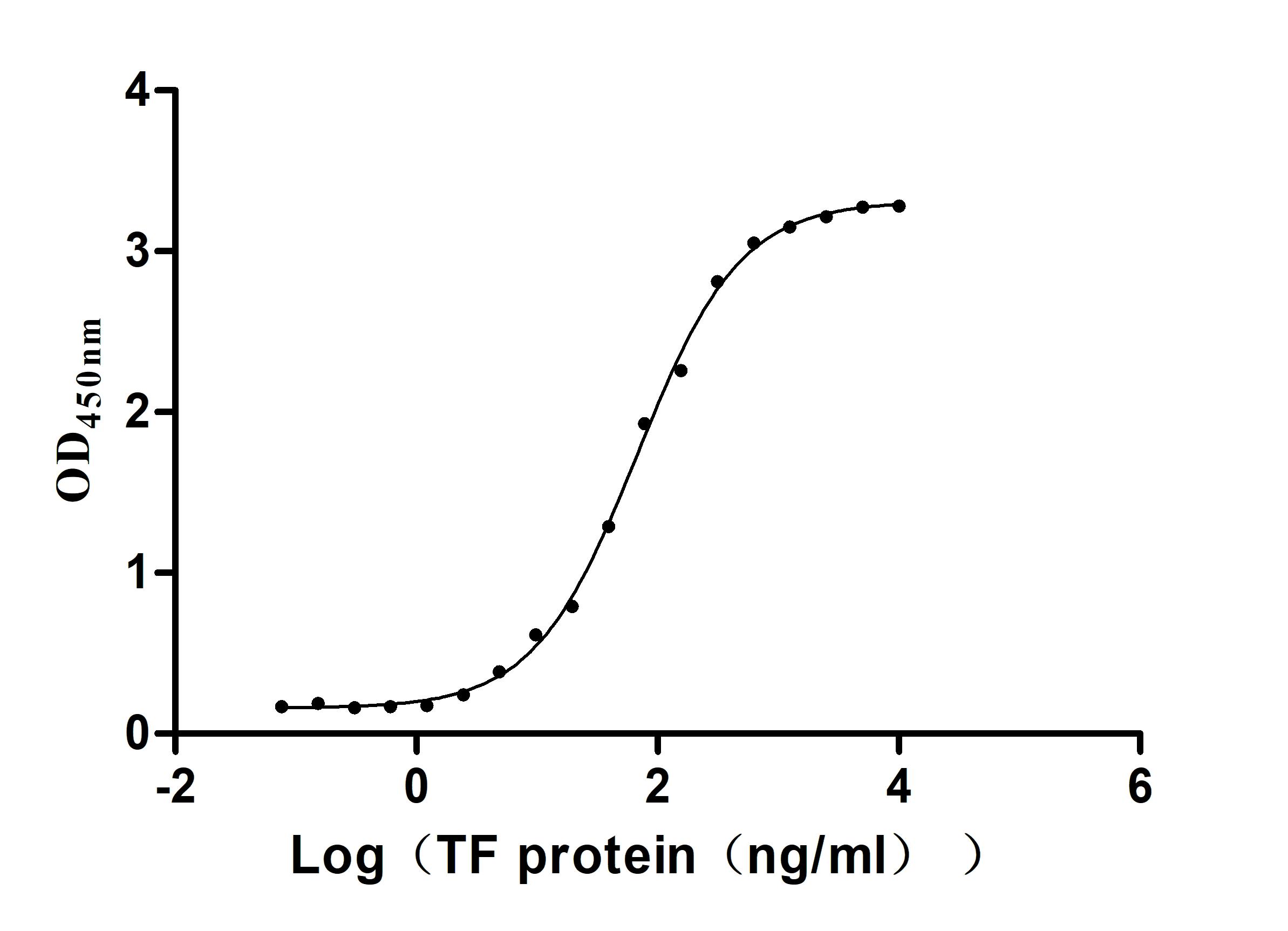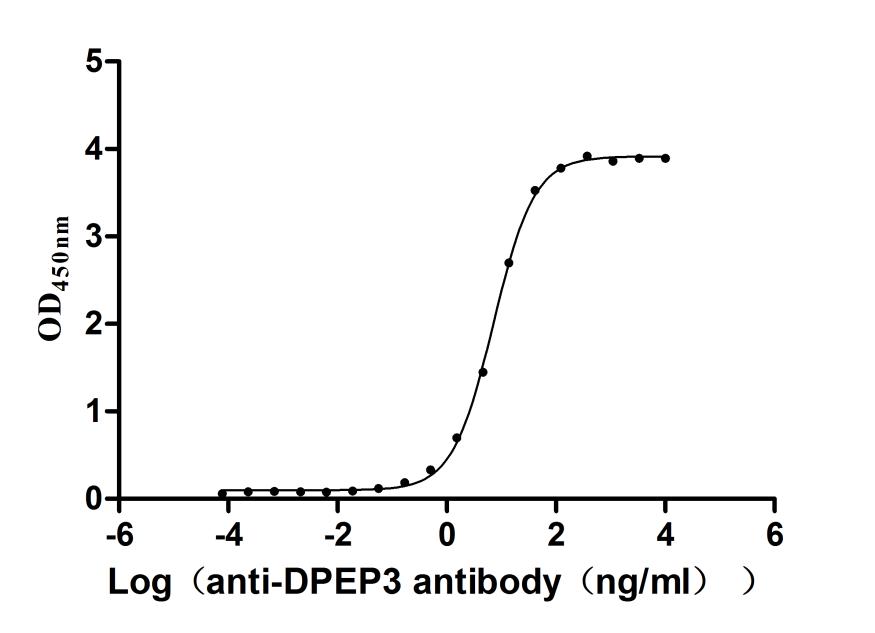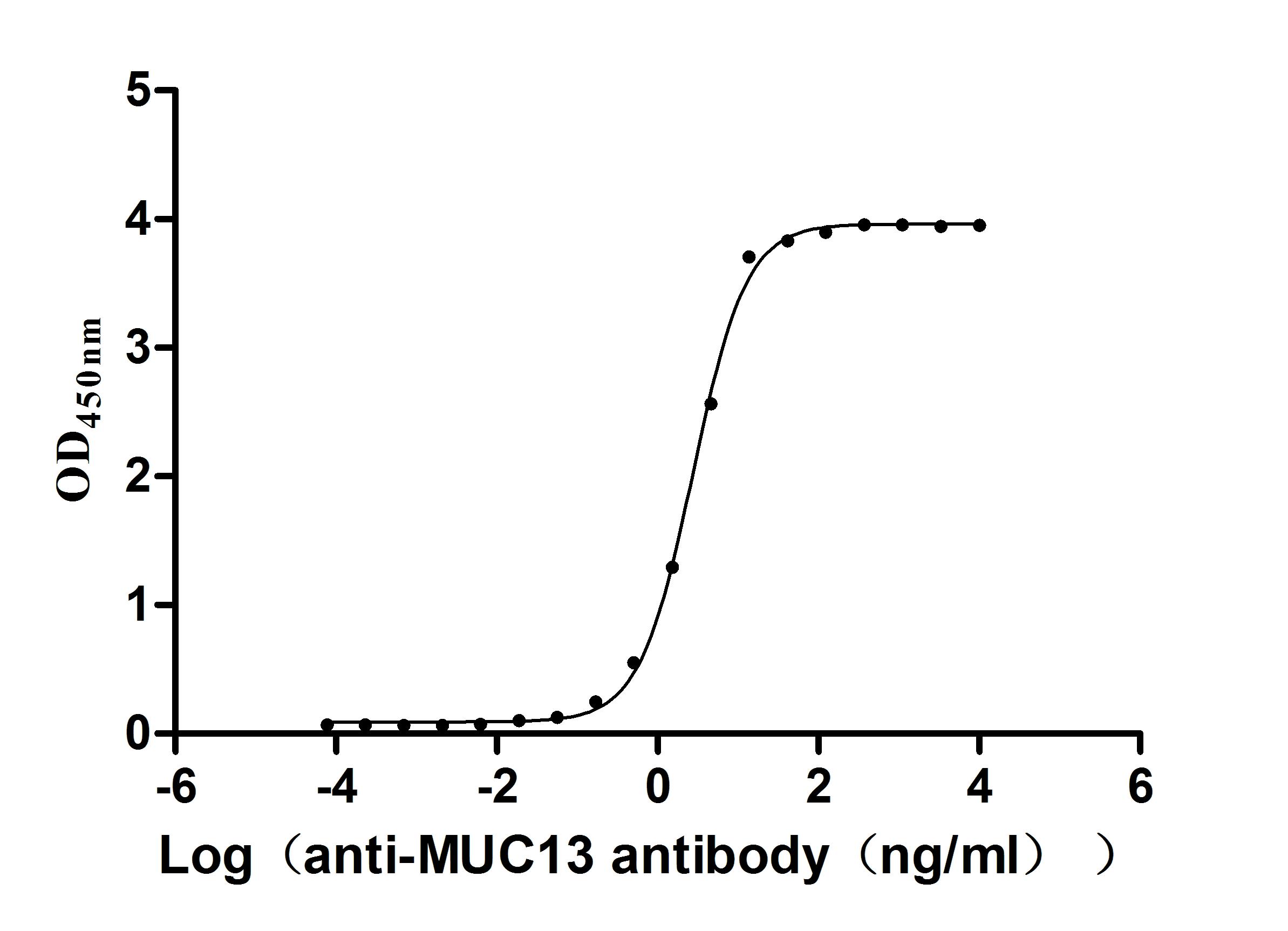Recombinant Human Lipoprotein lipase (LPL)
-
货号:CSB-YP013065HU
-
规格:
-
来源:Yeast
-
其他:
-
货号:CSB-EP013065HU
-
规格:
-
来源:E.coli
-
其他:
-
货号:CSB-EP013065HU-B
-
规格:
-
来源:E.coli
-
共轭:Avi-tag Biotinylated
E. coli biotin ligase (BirA) is highly specific in covalently attaching biotin to the 15 amino acid AviTag peptide. This recombinant protein was biotinylated in vivo by AviTag-BirA technology, which method is BriA catalyzes amide linkage between the biotin and the specific lysine of the AviTag.
-
其他:
-
货号:CSB-BP013065HU
-
规格:
-
来源:Baculovirus
-
其他:
-
货号:CSB-MP013065HU
-
规格:
-
来源:Mammalian cell
-
其他:
产品详情
-
纯度:>85% (SDS-PAGE)
-
基因名:
-
Uniprot No.:
-
别名:EC 3.1.1; EC 3.1.1.34; HDLCQ11; LIPD; LIPL_HUMAN; Lipoprotein lipase; LPL; LPL protein; MGC137861
-
种属:Homo sapiens (Human)
-
蛋白长度:Full Length of Mature Protein
-
表达区域:28-475
-
氨基酸序列ADQ RRDFIDIESK FALRTPEDTA EDTCHLIPGV AESVATCHFN HSSKTFMVIH GWTVTGMYES WVPKLVAALY KREPDSNVIV VDWLSRAQEH YPVSAGYTKL VGQDVARFIN WMEEEFNYPL DNVHLLGYSL GAHAAGIAGS LTNKKVNRIT GLDPAGPNFE YAEAPSRLSP DDADFVDVLH TFTRGSPGRS IGIQKPVGHV DIYPNGGTFQ PGCNIGEAIR VIAERGLGDV DQLVKCSHER SIHLFIDSLL NEENPSKAYR CSSKEAFEKG LCLSCRKNRC NNLGYEINKV RAKRSSKMYL KTRSQMPYKV FHYQVKIHFS GTESETHTNQ AFEISLYGTV AESENIPFTL PEVSTNKTYS FLIYTEVDIG ELLMLKLKWK SDSYFSWSDW WSSPGFAIQK IRVKAGETQK KVIFCSREKV SHLQKGKAPA VFVKCHDKSL NKKSG
-
蛋白标签:Tag type will be determined during the manufacturing process.
The tag type will be determined during production process. If you have specified tag type, please tell us and we will develop the specified tag preferentially. -
产品提供形式:Lyophilized powder
Note: We will preferentially ship the format that we have in stock, however, if you have any special requirement for the format, please remark your requirement when placing the order, we will prepare according to your demand. -
复溶:We recommend that this vial be briefly centrifuged prior to opening to bring the contents to the bottom. Please reconstitute protein in deionized sterile water to a concentration of 0.1-1.0 mg/mL.We recommend to add 5-50% of glycerol (final concentration) and aliquot for long-term storage at -20℃/-80℃. Our default final concentration of glycerol is 50%. Customers could use it as reference.
-
储存条件:Store at -20°C/-80°C upon receipt, aliquoting is necessary for mutiple use. Avoid repeated freeze-thaw cycles.
-
保质期:The shelf life is related to many factors, storage state, buffer ingredients, storage temperature and the stability of the protein itself.
Generally, the shelf life of liquid form is 6 months at -20°C/-80°C. The shelf life of lyophilized form is 12 months at -20°C/-80°C. -
货期:Delivery time may differ from different purchasing way or location, please kindly consult your local distributors for specific delivery time.Note: All of our proteins are default shipped with normal blue ice packs, if you request to ship with dry ice, please communicate with us in advance and extra fees will be charged.
-
注意事项:Repeated freezing and thawing is not recommended. Store working aliquots at 4°C for up to one week.
-
Datasheet :Please contact us to get it.
相关产品
靶点详情
-
功能:Key enzyme in triglyceride metabolism. Catalyzes the hydrolysis of triglycerides from circulating chylomicrons and very low density lipoproteins (VLDL), and thereby plays an important role in lipid clearance from the blood stream, lipid utilization and storage. Although it has both phospholipase and triglyceride lipase activities it is primarily a triglyceride lipase with low but detectable phospholipase activity. Mediates margination of triglyceride-rich lipoprotein particles in capillaries. Recruited to its site of action on the luminal surface of vascular endothelium by binding to GPIHBP1 and cell surface heparan sulfate proteoglycans.
-
基因功能参考文献:
- LPL-mediated release of essential fatty acid DHA regulates hematopoietic stem progenitor cell expansion and definitive hematopoiesis PMID: 29615667
- the negatively charged IDR of GPIHBP1 traverses a vast space, facilitating capture of LPL by capillary endothelial cells and simultaneously contributing to GPIHBP1's ability to preserve LPL structure and activity. PMID: 29899144
- nder optimal conditions, the electrochemical DNA biosensor exhibited desirable performance for the determination of rs1801177 (of the lipoprotein lipase )with a wide linearity ranging from 10 fM to 10nM and a relatively low detection limit of 3.33 fM (S/N=3). PMID: 29175215
- A link between the expression of LPL in the tumor cells and a poor clinical outcome of patients suffering chronic lymphocytic leukemia has been established. (Review) PMID: 29206143
- Pvu II restriction fragment length polymorphism associated with an elevated risk of hypertriglyceridemia [meta-analysis] PMID: 28502159
- When her TG levels normalized after incidental use of prednisone, an autoimmune mechanism was suspected. Immunoblot analyses showed the presence of autoantibodies to LPL in the patient's plasma. Autoantibodies to LPL decreased by 37% while patient was on prednisone, and by 68% as she subsequently transitioned to hydroxychloroquine monotherapy PMID: 28916403
- Updated LPL structural models were generated by combining disulfide mapping, computational modeling, and data derived from single-molecule Forster resonance energy transfer. New computational suggest that LPL may dimerize using an interface that is different from the dimerization interface suggested by crystal packing contacts seen in structures of pancreatic lipase. PMID: 29303250
- This meta-analysis suggested that LPL HindIII variants were associated with a decreased risk of stroke in the Asian population, but not in the non-Asian population. PMID: 28687421
- LPL HindIII (+/-) and PvuII (+/-), but not the Ser447Ter, might significantly reduce the risk of ischemic stroke. PMID: 29718838
- apoC-III potently inhibits triglyceride hydrolysis when LPL is bound to GPIHBP1 PMID: 28694296
- The results of this meta-analysis suggested that the LPL S447X polymorphism is likely to be a protective factor in the development of hypertension. PMID: 28640651
- Sequence variation in Kuwaiti Arabs was compared to other populations and was found to be similar with regards to the number of SNPs, InDels and distribution of the number of variants across the LPL gene locus and minor allele frequency PMID: 29438437
- Regression analysis revealed significant risk for memory loss that are dependent on age and genetic variants like LPL. PMID: 28777751
- The findings in this study suggest that there is a poor concordance between apo E genotyping and lipoprotein electrophoresis in diagnosing dysbetalipoproteinemia. PMID: 28689531
- mutation of a conserved cysteine in GPIHBP1 abolishes the ability of GPIHBP1 to bind LPL PMID: 28476858
- ANGPTL8 has a functional LPL inhibitory motif, but only inhibits LPL and increases plasma TG levels in mice in the presence of ANGPTL3 PMID: 28413163
- The expression of COBLL1, LPL, and ZAP70 corresponded to patient prognosis and to IGHV mutational status, although not absolutely. When we combined all three markers together and performed the ROC analysis, AUC increased compared to the AUC of individual gene expression. PMID: 27185377
- heterozygous N291S mutation in the lipoprotein lipase gene impairs whole-body insulin sensitivity and affects a distinct set of plasma metabolites in humans PMID: 28502509
- The s now show: (1) that ANGPTL4 inactivates LPL by catalyzing the unfolding of its hydrolase domain; (2) that binding to GPIHBP1 renders LPL largely refractory to this inhibition; and (3) that both the LU domain and the intrinsically disordered acidic domain of GPIHBP1 are required for this protective effect. PMID: 27929370
- Carrier status for the two common LPL variants: 447Ter (low TG/high HDL-C) and 291Ser (high TG/low HDL-C) was determined. Compared with the reference variant, the prevalence of metabolic syndrome was lower in carriers of the 447Ter variant (11.2% vs. 17.9%, P < 0.001) but with no difference in carriers of the 291Ser variant (18.4% vs. 16.5%, P = 0.59). PMID: 27676127
- A rare variant in APOC3(rs138326449) has been associated with triglyceride, very low-density lipoprotein, and high-density lipoprotein levels, as well as risk of coronary heart disease. Effects are unlikely to be solely predictable by the action of APOC3 through LPL. PMID: 27114411
- LPL gene polymorphisms are not genetic markers for the development of stroke in the Colombian sample used. PMID: 28293042
- Acute hypoxia strongly inhibits lipoprotein lipase activity in differentiated human preadipocytes. PMID: 27421877
- novel mutations cause type 1 hyperlipoproteinemia by inducing a loss or reduction in LPL secretion accompanied by a loss of LPL enzymatic activity PMID: 27578112
- LPL HindIII polymorphism was significantly associated with the risk of coronary artery disease (CAD); for Ser447X polymorphism, it was found that only XX genotype was significantly associated with CAD risk; PvuII polymorphism had no significant association with CAD risk; LPL HindIII polymorphism might serve as a potential biomarker for CAD risk PMID: 28275220
- Rare variants in LPL and a common variant in APOA5 were more commonly found in Thai subjects with severe hypertriglyceridemia PMID: 27206937
- apoC-I inhibited in situ LPL activity in adipocytes in both a concentration- and time-dependent manner. There was no change in postprandial WAT apoC-I secretion. WAT apoC-I secretion may inhibit WAT LPL activity and promote delayed chylomicron clearance in overweight and obese subjects PMID: 27040450
- isothermal titration calorimetry (ITC) can be used for quantitative measurements of LPL activity and interactions under in vivo-like conditions, for comparisons of the properties of plasma samples from patients and control subjects as substrates for LPL, as well as for testing of drug candidates developed with the aim to affect the LPL system. PMID: 27845686
- mAbs RE3 and RG3 bound with reduced affinity to a mutant GPIHBP1 containing an Ly6 domain mutation (W109S) that abolishes LPL binding. Immunohistochemistry studies with the GPIHBP1 mAbs revealed that human GPIHBP1 is expressed only in capillary endothelial cells. Finally, we created an ELISA that detects GPIHBP1 in human plasma. PMID: 27875259
- Iotansulin decreased LPL mRNA levels in HepG2 cells and this was associated with phosphorylation of AKT and nuclear export of FOXA2. PMID: 28126606
- The binding of both antibody 88B8 and GPIHBP1 to LPL depends on large segments of LPL's carboxyl-terminal domain. PMID: 27494936
- Loss of Lipoprotein Lipase is associated with Pancreatitis. PMID: 27412455
- In this study, most of the LPL gene variants were not significantly different in adolescents with normal and elevated triglceryide levels PMID: 28397436
- The data suggest the importance of C-mannosylation for LPL functions. PMID: 28327359
- The single nucleotide polymorphisms in lipoprotein lipase, ApoA5, and CETP were associated with serum triglycerides and HDL-cholesterol levels, but not with coronary artery disease in Pakistani population under study. PMID: 28143480
- An LPL structural model suggests that the LPL S447X truncation exposes residues implicated in LPL binding to lipoprotein binding uptake receptors, such as GPIHBP1. PMID: 27984852
- results confirm that LPL expression is a strong predictor of outcome in chronic lymphocytic leukemia, indicating a progressive course with poor survival PMID: 27757836
- Reduced LPL expression in placenta, limited increase in LPL level in maternal plasma, and abnormal lipid profiles were found in patients with intrahepatic cholestasis of pregnancy. PMID: 27400425
- The presence of rare damaging mutations in LPL was significantly associated with higher triglyceride levels and presence of coronary artery disease. PMID: 28267856
- Data show that polymorphisms of rs662799 and rs2266788 in APOA5 gene, rs320 in LPL gene and rs708272 in CETP gene had significant association with the effect of the lipid-lowering therapy via atorvastatin on ischemic stroke patients. PMID: 27415775
- NOTCH1 mutations are tightly associated with LPL gene expression. LPL expression is independently associated with poor outcome in CLL and can be measured as a categorical variable. PMID: 26558352
- Polymorphisms in the LPL gene are associated with increased risk of acute non-biliary pancreatitis. PMID: 27270932
- No significant increase of LPL activity was found at CM and VLDL overload after different kinds of food intake PMID: 27908779
- LPL and PLTP appear to be novel glioma-associated proteins and play a role in the progression of human glioma PMID: 27864281
- The acidic domain of GPIHBP1 stabilizes LPL catalytic activity by mitigating the global unfolding of LPL's catalytic domain. PMID: 26725083
- Chronic lymphocytic leukemia patients with high UGT2B17 and LPL expression have significantly reduced survival. PMID: 26589911
- Regulation of LPL by the miR-29, miR-1277 and miR-410 that is lost in presence of Hap4, a specific LPL TG-lowering haplotype. Consequently p.Ser474Ter association with TG concentration could be at least partially explained by its strong linkage disequilibrium with these functional 3'UTR SNPs. PMID: 26820803
- eleterious mutations associated with LPL deficiency PMID: 27055971
- In the present study, the D9N, N291S, and T495G polymorphisms of the LPL gene were not risk factors for the development of CVD. PMID: 26853140
- S447X polymorphism is associated with postprandial triacylglycerol and glucose. PMID: 26999119
显示更多
收起更多
-
相关疾病:Lipoprotein lipase deficiency (LPL deficiency)
-
亚细胞定位:Cell membrane; Peripheral membrane protein; Extracellular side. Secreted. Secreted, extracellular space, extracellular matrix.
-
蛋白家族:AB hydrolase superfamily, Lipase family
-
组织特异性:Detected in blood plasma. Detected in milk (at protein level).
-
数据库链接:
HGNC: 6677
OMIM: 238600
KEGG: hsa:4023
STRING: 9606.ENSP00000309757
UniGene: Hs.180878
Most popular with customers
-
Recombinant Human UL16-binding protein 1 (ULBP1) (Active)
Express system: Mammalian cell
Species: Homo sapiens (Human)
-
Recombinant Human Claudin-18.2 (CLDN18.2)-VLPs (Active)
Express system: Mammalian cell
Species: Homo sapiens (Human)
-
Recombinant Human Trophoblast glycoprotein (TPBG), partial (Active)
Express system: Mammalian cell
Species: Homo sapiens (Human)
-
Recombinant Human Serotransferrin(TF) (Active)
Express system: Mammalian cell
Species: Homo sapiens (Human)
-
Recombinant Human Dipeptidase 3(DPEP3), partial (Active)
Express system: Mammalian cell
Species: Homo sapiens (Human)
-
Recombinant Human Mucin-13(MUC13),partial (Active)
Express system: yeast
Species: Homo sapiens (Human)


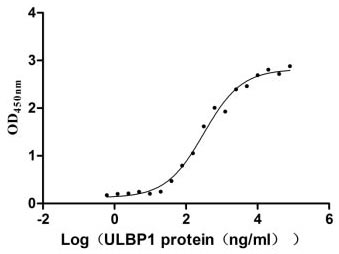
-AC1.jpg)
